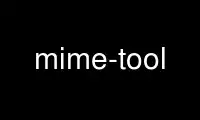
This is the command mime-tool that can be run in the OnWorks free hosting provider using one of our multiple free online workstations such as Ubuntu Online, Fedora Online, Windows online emulator or MAC OS online emulator
PROGRAM:
NAME
mime-tool - a simple program to construct MIME messages with attached files
SYNOPSIS
mime [ -dDvV ] [ -S subject ] [ -F from-address ] [ -T to-address ] [ -C carbon-copy
address ] [ -P prolog-text ] [ -E epiplogue-text ] [ -B boundry ] [ -O overall content-
type ] { [ -78abiquxopm ] [ -t content-type ] filename }
DESCRIPTION
The mime program constructs MIME messages with attached files. The user can specify the
content type (application/octet-stream, text/plain or a user specified type), content type
encoding (7bit, 8bit, binary, base64 and auto-detect), content disposition (attached or
inline) and the content boundry string. The user can also specify some mail related
options: subject, from-address, to-addres, carbon-copy addres, prolog-text and epilog-
text.
The output of the MIME-tool program can be sent directly to the mail, mailx or sendmail
commands (or any other command that accepts RFC-822 formatted messages).
NOTE: Specifying 7-bit encoding for an attachment that contains 8-bit data will convert
any data bytes whose high-bit is set to question marks.
OPTIONS
-7 7-bit ASCII encoding
-8 8-bit ASCII encoding
-a application/octet-stream content type
-b binary encoding
-d low detail debugging
-D high detail debugging
-s write a subpart
-i disposition: inline (instead of attachment)
-q quoted-printable encoding
-c content-type
explicit content type
-t text/plain content type
-o omit disposition line
-u unknown encoding, auto-detect
-v verbose messages
-V very verbose messages
-x base64 encoding
-p copy existing MIME part
-o omit content-disposition
-m omit content-transfer-encoding
-n filename
override the filename in the disposition header
-N don't add a filename parameter in the disposition header
-0 no-op
EXAMPLES
Using MIME-tool to write a mail message to a file:
mime -S "test message" -F [email protected] -T [email protected] file1 > test.msg
Using MIME-tool with the mail command:
mime -S "test message" -F [email protected] file1 | mail [email protected]
Using MIME-tool with the mailx command:
mime -S "test message" -F [email protected] file1 | mailx [email protected]
Using MIME-tool with the sendmail command:
mime -S "test message" -F [email protected] file1 | sendmail [email protected]
VERSION
This is version 1.5.topal3 from June 2009.
KNOWN BUGS
Most of the header values are not properly quoted or folded, so long or complex values for
these headers may cause problems. Specifically, the from-address, to-address, carbon-copy-
address and content-type headers may not be properly quoted or folded.
For some reason, certain e-mail clients (espcially from a large software company located
in Redmond, Washington) don't seem to recognize file attachments as attachments, but
instead displays them as inline attachments. (maybe this isn't MIME-tool's fault, but
I've gotten a few e-mails about it, so I'm mentioning it here)
Use mime-tool online using onworks.net services
